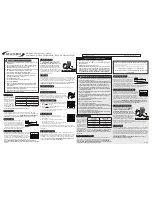
10
Disconnect from vacuum
hose before making any
assembly, adjustments or changing
accessories
. Such preventive safety measures
reduce the risk of starting the tool accidentally.
Empty your vacuum’s dust
canister before use and
before storing.
Be extremely careful of dust
disposal, materials in fine particle form may be
explosive. Do not throw sanding dust on an
open fire. Combustion from mixture of varnishes,
lacquers, polyurethane, oil or water with dust
particles can occur if there is a static discharge,
spark introduced in the box, or excessive heat.
Rotary Tool Introduction
The Rotary Tool has a small, powerful motor, is
comfort able in the hand, and is made to accept a
large variety of accessories. Accessories come in a
variety of shapes and permit you to do a number of
different jobs. As you be come familiar with the
range of accessories and their uses, you will learn
just how versatile the Rotary Tool is. You’ll see
dozens of uses you hadn’t thought of before.
The real secret of the Rotary Tool is its speed. To
understand the advantages of its high speed, you
have to know that the standard portable electric
drill runs at speeds up to 2,800 revolutions per
minute. The Rotary Tool operates at speeds up to
30,000 revolutions per minute. The typical electric
drill is a low-speed, high torque tool; the Rotary
Tool is just the opposite – a high-speed, low torque
tool. The major difference to the user is that in the
high speed tools, the speed combined with the
acces sory mounted in the collet does the work.
You don’t apply pressure to the tool, but simply
hold and guide it. In the low speed tools, you not
only guide the tool, but also apply pressure to it, as
you do, for example, when drilling a hole.
It is this high speed, along with its compact size
and wide variety of special accessories and
attachments, that makes the Rotary Tool differ ent
from other tools. The speed enables it to do jobs
low speed tools cannot do, such as en graving
glass, etc.
Getting the most out of your Rotary Tool is a matter
of learning how to let this speed work for you. To
learn about more uses and the versatility of Dremel
accessories and attachments refer to this Owner's
Manual or check our website at www.Dremel.com.
Using the Rotary Tool
The first step in learning to use the Rotary Tool is
to get the “feel” of it. Hold it in your hand and feel
its weight and balance. Feel the taper of the
housing. This taper permits the Rotary Tool to be
grasped much like a pen or pencil (Figure A).
Always hold the tool away from your face.
Accessories can be damaged during handling, and
can fly apart as they come up to speed. This is not
Operating Instructions
!
WARNING
The “Golf Grip” method of holding the tool is
used for more aggressive operations such as
grinding a flat surface or using cutoff wheels.
FIG. A
FIG. B
For best control in close work, grip the Rotary
Tool like a pencil between your thumb and
forefinger.
!
WARNING
Summary of Contents for VRT1
Page 47: ...47 Notes Remarques Notas ...
Page 48: ...2610034232 03 15 2610034232 ...











































